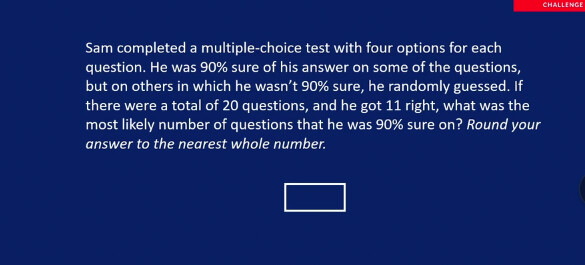
In this problem , greg says that let x be the no of questions , he was 90% sure and 20-x be the no of questions, where he was not 90% sure.
Total no of questions he got right=11
so, he equated 0.9x + 0.25(20-x) =11
My question is how can we form an equation between his guessing % and his no of right answers?
maybe he might have got all his right answers from the questions he was not 90% sure, maybe he got lucky . how does guessing percentage has to do with securing a mark for the question?
Hey, the guessing percentage is basically the probability of the test taker getting the right answer.
If that was the case, then let us assume x=0 (the number of questions he was 90% sure on), so he has to do 20 questions and get 11 right with a probability of 0.25. The Number of right answers he would get = (probability of getting right answer) x (number of questions). Which in this case will be 0.25 x 20 = 5. So pure guessing will only give him 5 right answers and the question asks for 11.
Hey! Thank you for your reply , so if he had a probability of 0.25 , then he can have at the most have 5 questions right. But there is no surity that he will get the 5 , he may or not. Is it right?
That’s why the question asks for the most likely number of questions. Of course, he could have been lucky. But the probability of his getting the questions right by guessing is far lesser than the probability of getting them right when he is 90% sure of them.
Got it mate ! Thanks a lot :))
